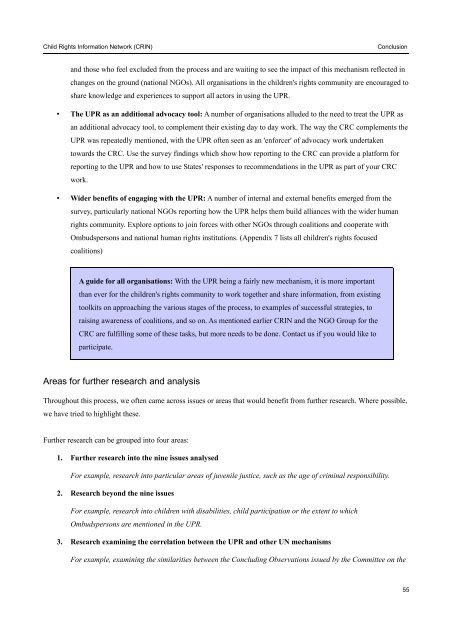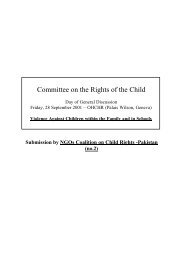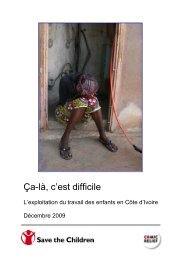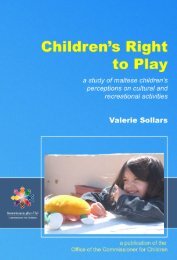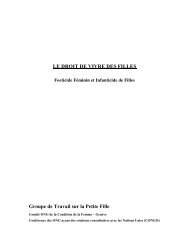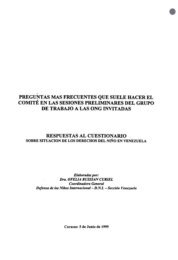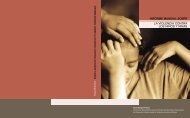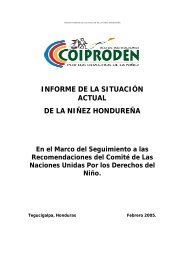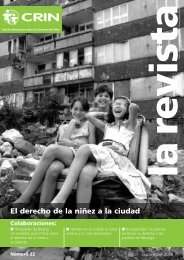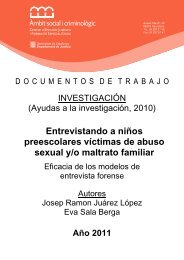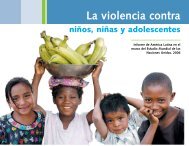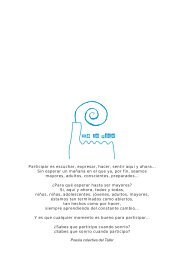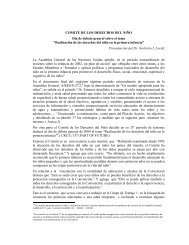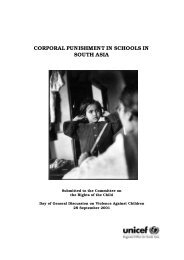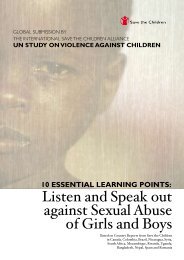Universal Periodic Review: The Status of Children's Rights - CRIN
Universal Periodic Review: The Status of Children's Rights - CRIN
Universal Periodic Review: The Status of Children's Rights - CRIN
You also want an ePaper? Increase the reach of your titles
YUMPU automatically turns print PDFs into web optimized ePapers that Google loves.
Child <strong>Rights</strong> Information Network (<strong>CRIN</strong>) Conclusion<br />
and those who feel excluded from the process and are waiting to see the impact <strong>of</strong> this mechanism reflected in<br />
changes on the ground (national NGOs). All organisations in the children's rights community are encouraged to<br />
share knowledge and experiences to support all actors in using the UPR.<br />
• <strong>The</strong> UPR as an additional advocacy tool: A number <strong>of</strong> organisations alluded to the need to treat the UPR as<br />
an additional advocacy tool, to complement their existing day to day work. <strong>The</strong> way the CRC complements the<br />
UPR was repeatedly mentioned, with the UPR <strong>of</strong>ten seen as an 'enforcer' <strong>of</strong> advocacy work undertaken<br />
towards the CRC. Use the survey findings which show how reporting to the CRC can provide a platform for<br />
reporting to the UPR and how to use States' responses to recommendations in the UPR as part <strong>of</strong> your CRC<br />
work.<br />
• Wider benefits <strong>of</strong> engaging with the UPR: A number <strong>of</strong> internal and external benefits emerged from the<br />
survey, particularly national NGOs reporting how the UPR helps them build alliances with the wider human<br />
rights community. Explore options to join forces with other NGOs through coalitions and cooperate with<br />
Ombudspersons and national human rights institutions. (Appendix 7 lists all children's rights focused<br />
coalitions)<br />
A guide for all organisations: With the UPR being a fairly new mechanism, it is more important<br />
than ever for the children's rights community to work together and share information, from existing<br />
toolkits on approaching the various stages <strong>of</strong> the process, to examples <strong>of</strong> successful strategies, to<br />
raising awareness <strong>of</strong> coalitions, and so on. As mentioned earlier <strong>CRIN</strong> and the NGO Group for the<br />
CRC are fulfilling some <strong>of</strong> these tasks, but more needs to be done. Contact us if you would like to<br />
participate.<br />
Areas for further research and analysis<br />
Throughout this process, we <strong>of</strong>ten came across issues or areas that would benefit from further research. Where possible,<br />
we have tried to highlight these.<br />
Further research can be grouped into four areas:<br />
1. Further research into the nine issues analysed<br />
For example, research into particular areas <strong>of</strong> juvenile justice, such as the age <strong>of</strong> criminal responsibility.<br />
2. Research beyond the nine issues<br />
For example, research into children with disabilities, child participation or the extent to which<br />
Ombudspersons are mentioned in the UPR.<br />
3. Research examining the correlation between the UPR and other UN mechanisms<br />
For example, examining the similarities between the Concluding Observations issued by the Committee on the<br />
55


